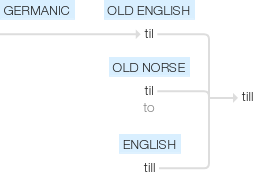Till
Old English til, of Germanic origin; related to Old Norse til ‘to’, also ultimately to till3.
wiktionary
From Middle English til, from NorthernOld English til, from or akin to Old Norse til(“to, till”); both from Proto-Germanic *til(“to, toward”), from Proto-Germanic *tilą(“planned point in time”). [1] [2] Not a shortening of until; rather, until comes from till with the prefix un-(“against; toward; up to”) also found in unto. Cognate with Old Frisian til(“to, till”), Danish til(“to”), Swedish till(“to, till”), Icelandic til(“to, till”). Also related to Old English til(“good”), German Ziel(“goal”), Gothic 𐍄𐌹𐌻( til, “something fitting or suitable”).
From Middle English tylle(“till”), possibly from Middle English tillen(“to draw”) from Old English *tyllan(“to draw, attract”) (as in betyllan(“to lure, decoy”) and fortyllan(“to draw away”); related to *tollian > Middle English tollen). Cognate with Albanian ndjell(“I lure, attract”).
Alternatively, Middle English tylle is from Anglo-Norman tylle(“compartment”), from Old French tille(“compartment, shelter on a ship”), from Old Norse þilja(“plank”).
From Middle English tilyen, from Old English tilian.
Unknown, but possibly via etymology 3 (the verb) because alluvial deposit is used as a fertilizer.
From Middle English tylle; shortened from lentile (English lentil).
etymonline
till (prep.)
"until," Old English til (Northumbrian) "to," from Old Norse til "to, until," from Proto-Germanic *tilan (source also of Danish til, Old Frisian til "to, till," Gothic tils "convenient," German Ziel "limit, end, goal"). A common preposition in Scandinavian, serving in the place of English to, probably originally the accusative case of a noun now lost except for Icelandic tili "scope," the noun used to express aim, direction, purpose (as in aldrtili "death," literally "end of life"). Also compare German Ziel "end, limit, point aimed at, goal," and till (v.).
till (v.)
"cultivate (land)" early 13c.; "plow," late 14c., from Old English tilian "cultivate, tend, work at, get by labor," originally "strive after, aim at, aspire to," related to till "fixed point, goal," and til "good, useful, suitable," from Proto-Germanic *tilojan (source also of Old Frisian tilia "to get, cultivate," Old Saxon tilian "to obtain," Middle Dutch, Dutch telen "to breed, raise, cultivate, cause," Old High German zilon "to strive," German zielen "to aim, strive"), from source of till (prep.).
For sense development, compare expression work the land, Old Norse yrkja "work," but especially "cultivate" (and also "to make verses"); Old Church Slavonic delati "work," also "cultivate." Related: Tilled; tilling.
till (n.)
"cashbox," mid-15c., from Anglo-French tylle "compartment," Old French tille "compartment, shelter on a ship," probably from Old Norse þilja "plank, floorboard," from Proto-Germanic *theljon. The other theory [Klein, Century Dictionary] is that the word is from Middle English tillen "to draw," from Old English -tyllan (see toll (v.)), with a sense evolution as in drawer (see draw (v.)).
